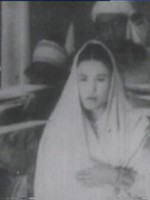Joymoti is a film of genre Biography directed by Jyoti Prasad Agarwala with Aideu Handique
Joymoti (1935)
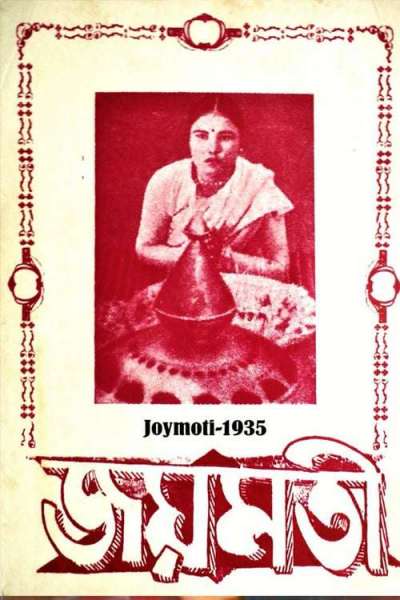
If you like this film, let us know!
Joymoti or Joimoti (Assamese: জয়মতী), released on 10 March 1935, was the first Assamese film made. Based on Lakshminath Bezbaroa's play about the 17th-century Ahom princess Soti Joymoti, the film was produced and directed by the noted Assamese poet, author, and film-maker Jyoti Prasad Agarwala, and starred Aideu Handique and acclaimed stage actor and playwright Phani Sarma. The film, shot between 1933 and 1935, was released by Chitralekha Movietone in 1935 and marked the beginning of Assamese cinema.
Joymoti was screened at the 50th International Conference of the Society For Cinema and Media Studies (SCMC) of Northwestern University in Evanston, Illinois, in March 2011.
Other screenings include:
India-Bangladesh Joint Celebration of 100 Years of Indian Cinema, Dhaka (2012)
UCLA's Centre for India and South Asia Studies, Los Angeles (April 2010)
Osian-Cinefan's 10th Film Festival of Asian and Arabic Cinema, New Delhi (2008)
Filmbüro Baden Württemberg's Internationales Indisches Filmfestival, Stuttgart (2006)
Asiaticafilmidale (Encounters with Asian Cinema), Rome (2006)
Munich Film Festival (2006).
Although never a commercial success, Joymoti was noted for its political views and the use of a female protagonist, something almost unheard of in Indian cinema of the time.
The film was the first Indian talkie to have used Dubbing and Re-recording Technology, and the first to engage with "realism" and politics in Indian cinema. The original print containing entire length of the film was thought to be lost after India's division in 1947. However, in 1995, popular Assamese story-writer, novelist, engineer, actor, screenwriter and documentary film director Arnab Jan Deka managed to recover entire footage of the lost film at a Studio in Bombay in intact condition, and reported back the matter to Assam Government apart from writing about this recovery in Assamese daily Dainik Asam and English daily The Assam Express. Afterwards, when other prominent English and Hindi dailies like The North East Times, The News Star and Purvanchal Prahari publicly acknowledged the selfless public service of Arnab Jan Deka, the original film's director Jyotiprasad's younger brother Hridayananda Agarwala and famous Assamese actor Satya Prasad Barua also confirmed and publicly acknowledged Arnab Jan Deka's great recovery of the first original full-length print of this historic pioneer film through two separate write-ups in Dainik Asam and highly circulated English daily The Assam Tribune respectively in 1996. This matter was also debated at Assam Legislative Assembly, and Secretary, Cultural Affairs Department of Assam Government, convened an official meet to discuss this matter together with other issues pertaining to development of Assamese films. Meanwhile, some reels of another remaining print of the film maintained by Hridayananda Agarwala has been restored in part by Altaf Mazid.
Synopsis
Set in 17th-century Assam, the film recounts the sacrifice of Joymoti, an Ahom princess tortured and killed by the Ahom king Borphukan for refusing to betray her husband Gadapani by disclosing his whereabouts. The event is interpreted in contemporary patriotic terms, and calls for a greater harmony between the people of the hills and those of the plains. The hills are represented by the leader Dalimi, a Naga tribeswoman who shelters the fugitive Prince Gadapani.Actors
Comments
Leave comment :
Suggestions of similar film to Joymoti
There are 5 films with the same actors, 1 films with the same director, 6484 with the same cinematographic genres (including 790 with exactly the same 2 genres than Joymoti), to have finally 70 suggestions of similar films.If you liked Joymoti, you will probably like those similar films :
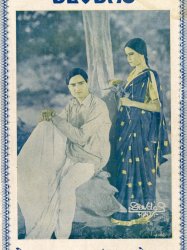
Devdas (1936)
, 2h19Directed by P.C. Barua
Genres Drama, Romance
Themes Films about alcoholism, Medical-themed films, Films about music and musicians, Films about drugs, Films about sexuality, Erotic films, Films about prostitution, Musical films, Bollywood
Actors Kundan Lal Saigal, Jamuna Barua, P.C. Barua, Thanjavur Ranganayaki Rajakumari, Rajkumari, Phani Sarma
Rating59%





Devdas (K. L. Saigal) falls in love with Parvati (Jamuna) with whom he has played since childhood and who is the daughter of a poor neighboring family. Devdas goes away to Calcutta for University studies. Meanwhile, Parvati's father arranges her marriage to a much older man. Though she loves Devdas, she obeys her father to suffer in silence like a dutiful Hindi wife. Devdas as a result takes to drink. Chandramukhi (Rajkumari), a dancing girl or 'prostitute' he has befriended in Calcutta, falls for him and gives up her profession to try to save him. Parvati, hearing of his decline, comes to see him to steer him away from a life of drinking. Devdas sends her back saying in his hour of final need he will come to her. She returns to her life of duty. Realising his end is near, Devdas decides to keep his promise and meet Parvati. He journeys all night, reaches her house and is found dead outside the high walls of her house. Inside Parvati hears that Devdas is dead.

Meera (1979)
, 2h35Directed by Gulzar
Genres Drama, Biography, Historical
Themes Films about religion, Political films
Actors Hema Malini, Vinod Khanna, Dr. Shriram Lagoo, Shammi Kapoor, Dina Pathak, Om Shivpuri
Rating65%





The story is set around 1580, in the time of King Akbar. Biramdev (Dr Shreeram Lagoo) is the king of Medta, a province in Rajasthan. He has two daughters, Meera (Hema Malini) and Krishna (Vidya Sinha) and a son, Jaimal (Dinesh Thakur). Meera is in deep emotional love with Lord Krishna, so much so that she considers Lord Krishna to be her husband. Akbar (Amjad Khan) is becoming stronger day by day and hence other small provinces are trying to join against him. Medta, in one such political agreement, decides to join hands with Raja Vikramajit (Shammi Kapoor). As a part of this agreement Meera is married (against her wish) to Vikramajit's son, Rana Bhojraj (Vinod Khanna). But even after getting married her love for Lord Krishna remains the same and she follows her own ideals and way of living which are not very acceptable to Bhojraj and his family. One thing leads to another and one day Meera is declared as an outcast and traitor who failed to play a wife's duties towards her husband, a bride's duties towards her family, and a woman's duties towards society. She is jailed and a public trial is ordered to decide her fate. But Meera is still unshakable and her spirituality keeps her going. She is not even afraid of death. Finally she is given a death sentence and is ordered to drink a cup of venom in front of the public.

Bathory: Countess of Blood (2008)
, 2h20Directed by Juraj Jakubisko
Origin Slovaquie
Genres Drama, Biography, Fantasy, Historical
Themes Films about religion, Films about sexuality, LGBT-related films, Serial killer films, LGBT-related films, LGBT-related film
Actors Anna Friel, Karel Roden, Hans Matheson, Vincent Regan, Franco Nero, Bolek Polívka
Rating56%





The film is based on the story of Erzsébet Bathory, a Hungarian countess in the 16th and 17th centuries. Her story takes place in a part of the Kingdom of Hungary that is now Slovakia. In this retelling, the Countess is a healer who conducts medical experiments and rudimentary autopsies in a "hospital" beneath her castle. She forms a relationship with a reputed witch, Darvulia, who saves her from poisoning. The witch promises Erzsebet a son and eternal beauty. In return, Erzsebet must sacrifice both love and her reputation. Darvulia becomes Erzsebet's companion. Meanwhile, maidens in the area have been dying of seemingly unrelated causes, and Erzsebet is seen bathing in a large tub of red liquid as the girls' now-mutilated corpses are buried nearby. Two monks later conclude that the water is not blood but is simply colored red by herbs.

Directed by Maurice Elvey
Origin United-kingdom
Genres Drama, Biography, Historical
Themes Political films
Actors Norman Page, Alma Reville, Ernest Thesiger, Eric Stuart
Rating65%





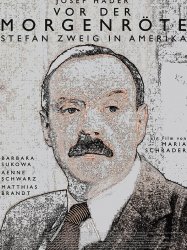 , 1h46
, 1h46Directed by Maria Schrader
Origin German
Genres Drama, Biography, Historical
Themes Films about writers
Actors Josef Hader, Barbara Sukowa, Nahuel Pérez Biscayart, Nicolau Breyner, Tómas Lemarquis, Vincent Nemeth
Rating66%





Les dernières années de la vie de l'écrivain autrichien Stefan Zweig, de son arrivée au Brésil en 1936 à son suicide dans le même pays le 22 février 1942, en quelques scènes situées également à Buenos Aires pour une session du PEN Club ainsi qu'à New York.

The Divine Emma (1979)
, 1h50Directed by Jiří Krejčík
Origin Tchecoslovaquie
Genres Drama, Biography, Historical, Musical
Actors Božidara Turzonovová, Josef Kemr, Miloš Kopecký, Václav Lohniský, Čestmír Řanda, Zdeněk Dítě
Rating68%





The film is a biographical account of Czech operatic soprano Emmy Destinn's life. The primary focus is on the singer's return from USA in 1914, and her subsequent involvement in the Czech patriotic resistance against Austria-Hungary during the WWI.
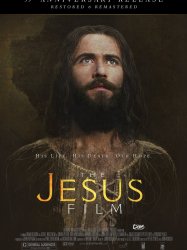
Jesus (1979)
, 1h55Directed by John Heyman, Peter Sykes, John Krish
Origin USA
Genres Drama, Biography, Fantasy, Historical
Themes Films set in Africa, Films about religion, Films about sexuality, Films based on the Bible, Portrayals of Jesus in film, Films about virginity
Actors Brian Deacon, Yosef Shiloach, Alexander Scourby, Richard Kiley, Eli Danker, Mosko Alkalai
Rating71%





La vie de Jésus Christ en suivant principalement l'évangile de Luc de la Bible.

The Edge of Love (2008)
, 1h50Directed by John Maybury
Origin United-kingdom
Genres Drama, Biography, Historical, Romance
Actors Keira Knightley, Sienna Miller, Cillian Murphy, Matthew Rhys, Lisa Stansfield, Alastair Mackenzie
Rating61%





The story is based loosely on real events and real people, drawing on David N. Thomas' book Dylan Thomas: A Farm, Two Mansions and a Bungalow.

Deadman's Curve (1978)
, 1h40Genres Drama, Biography, Historical, Musical
Themes Films about music and musicians, Musical films
Actors Richard Hatch, Bruce Davison, Susan Sullivan, Pamela Bellwood, Denise DuBarry, Kelly Ward
Rating68%





On Jan and Dean's rise to the top of the music industry, a horrible car accident leaves Jan incapacitated and their dreams shattered. With the help of Dean and others, Jan slowly recovers, learning again to walk and talk. A comeback to the music industry is seen as a slim chance, but Jan's willingness to try and with Dean right by his side, the duo aim for another shot.
 Connection
Connection
